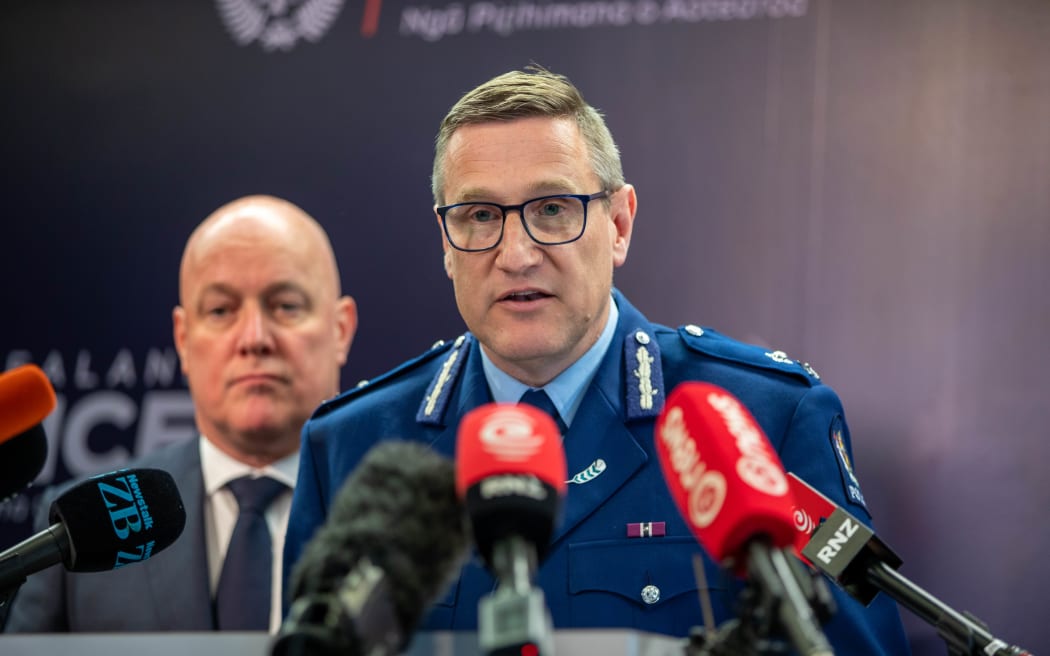
Who will be New Zealand's next top cop? The two contenders are: Deputy Commissioner Jevon McSkimming (left) and Assistant Commissioner Richard Chambers. Photo: Collage/ RNZ
The race for the next police boss has narrowed, with just two names still in consideration for the top job: Assistant Commissioner Richard Chambers and Deputy Commissioner Jevon McSkimming.
RNZ understands the pair are currently in the thick of interviews, as the Public Service Commission reaches the pointy end of its recruitment process.
Police Minister Mark Mitchell on Tuesday announced that Deputy Commissioner Tania Kura would step in to the role on an interim basis when Andrew Coster departs next month, to head up the government's Social Investment Agency.
The candidates: Richard Chambers

Assistant Commissioner Richard Chambers, speaking after the death of a police officer in 2020. Photo: RNZ / Sarah Robson
Chambers is known to have long-held ambitions to be top cop and is considered a favourite of frontline police.
He was recently seconded to a senior position at Interpol in France, but at the time indicated he intended to return to New Zealand.
Chambers first joined the police in 1996 as a constable in Avondale, but soon rose through the ranks. In a profile on the police website, he wrote he worked on "some fascinating investigations that included an exorcism, a recluse and a foreign national who travelled the world taking advantage of opportunities using false credentials".
Having been promoted to detective and then inspector, Chambers was appointed the area commander for Lower Hutt in 2007. After that, he held top roles in the Tasman and Southern districts and then Auckland City.
Chambers was promoted to assistant commissioner in 2016, leading investigations into serious and organised crime, and financial crime.
He also played a key role during the Covid-19 pandemic, tasked with co-leading the police response.
In March 2022, he spoke to RNZ about the operation to clear protesters from Parliament's grounds, praising the "incredible job" done by officers "in very challenging circumstances". He said the force used by police was proportionate to restoring order.
The candidates: Jevon McSkimming

Deputy Commissioner Jevon McSkimming speaking on 19 September, at a government media conference about police resources and numbers. Photo: RNZ / REECE BAKER
McSkimming was promoted to statutory deputy commissioner last year on the recommendation of then-Prime Minister Chris Hipkins. The role comes with a higher pay packet and status than standard deputy commissioners.
He currently oversees road policing and operational services, which include strategy, media and communications, risk and assurance, and firearms regulation and reform.
During the appointment process, it was noted he had a "relatively unique career path", working at police headquarters since 2010 across a range of areas: strategy, service delivery, resolution, financial planning, arms admin, ICT and infrastructure.
McSkimming joined the police in 1996 and worked on the frontline in Auckland and Southland.
He has also been responsible for large restructures - as well as managing police IT systems, property portfolio, vehicles, and launching the 105 non-emergency number.
In March, McSkimming spoke at the World Police Summit in Dubai, joining a panel on trust, fairness and resilience and giving a speech on the future of policing and organisational resilience.
In July, he spoke to RNZ after union members lost their long-running pay dispute with the government. He said many officers would be disappointed, but New Zealand police had an "excellent reputation" for being progressive and rewarding.
The stakes
All three coalition parties campaigned heavily on law and order. Mitchell was openly critical of Coster's implementation of "policing-by-consent", the principle that police must maintain the support of the public in order to hold legitimacy.
While in opposition, Mitchell vowed to "scrap Labour's policing-by-consent philosophy, which has been a failure, and encourage a back-to-basics policing model".
At the time, he told the Herald that he and Coster had "different views" on the "effectiveness" of the policing-by-consent approach.
Prime Minister Christopher Luxon, along with Mitchell, will ultimately decide on the successful candidate, before their official appointment by the Governor-General.
The job description, posted online by the Public Service Commission, stated that the commissioner, while independent of government, was required to "give effect to all priorities" outlined in the Police Minister's letter of expectations.
The most recent letter was issued to Coster in December and made clear the government's key focus on cracking down on gangs.
"I expect police to be using the full force of the law and the tools and resources it has available, to significantly disrupt gang and organised crime within communities across New Zealand," the letter stated.
The position would require "strong and decisive leadership" to overcome significant challenges to law and order, Mitchell wrote.
"My expectation is that that leadership is evident."







